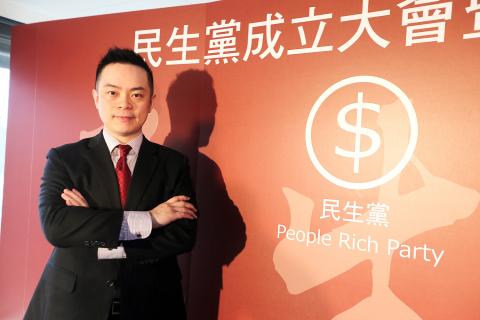Pianist and composer Chang Mu-ting (張穆庭) yesterday announced the founding of the People Rich Party (民生黨) with a pro-unification platform and himself as chairman.
The party is named after “people’s livelihood” (民生, minsheng) — one of Sun Yat-sen’s (孫逸仙) “three principles of the people” enshrined in the Republic of China’s (ROC) Constitution — to emphasize its concern with economic issues, Chang said.
The party aims to “effectively revive the Taiwanese economy, address the public’s economic concerns, insist on the 1992 consensus’ and implement the goal of national unification under the Additional Articles of the Constitution of the ROC,” Chang said, citing the party’s charter.

Photo: CNA
The party’s main agenda includes calling for a presidential pardon for Justin Lin (林毅夫) — who defected to China in 1979 when he was an army captain serving on Kinmen and later became a World Bank vice president, an immediate suspension of civil service pension reforms, ending cross-strait tensions and unification with China, Chang said.
He said the party aims to recruit 7,000 young people to participate in the next borough and village-level elections.
The Democratic Progressive Party (DPP) has been ineffectual in boosting the economy for small and medium-sized businesses and raising workers’ wages and it has “manipulated agendas to further Taiwanese independence,” Chang said.
He criticized the Chinese Nationalist Party (KMT) for spending all of its energy on internal political struggles while neglecting the nation’s young people.
Issuing a presidential pardon for Lin might help resolve cross-strait tensions, while a delay would exacerbate the situation, Chang said.
He said the People Rich Party would propose beginning the process of unification with China, and that “China” should become the name of the unified country.
The party’s economic policies include the creation of a ministry of tourism, boosting tourism according to the models of Thailand and other Southeast Asian nations, subordinating the government’s “new southbound policy” to Beijing’s “One Belt, One Road” initiative, abolishing the recent work-hour amendments to the Labor Standards Act (勞動基準法) and raising the minimum wage to NT$30,000 by 2024, Chang said.
Chang further called for deregulating Chinese capital investments in Taiwan, subsidies for start-ups by young people, a reversal of civil servant pension reforms, reducing the size of the civil service, legalizing gambling and support for the death penalty.
The “1992 consensus” — a term former Mainland Affairs Council chairman Su Chi (蘇起) said in 2006 that he had made up in 2000 — refers to a supposed understanding between the Chinese Nationalist Party (KMT) and the Chinese government that both sides acknowledge there is “one China,” with each side having its own interpretation of what “China” means.
Chang is best known as the composer of 1937, a song composed as a memorial to the 1937 Nanjing Massacre.

Alain Robert, known as the "French Spider-Man," praised Alex Honnold as exceptionally well-prepared after the US climber completed a free solo ascent of Taipei 101 yesterday. Robert said Honnold's ascent of the 508m-tall skyscraper in just more than one-and-a-half hours without using safety ropes or equipment was a remarkable achievement. "This is my life," he said in an interview conducted in French, adding that he liked the feeling of being "on the edge of danger." The 63-year-old Frenchman climbed Taipei 101 using ropes in December 2004, taking about four hours to reach the top. On a one-to-10 scale of difficulty, Robert said Taipei 101

A preclearance service to facilitate entry for people traveling to select airports in Japan would be available from Thursday next week to Feb. 25 at Taiwan Taoyuan International Airport, Taoyuan International Airport Corp (TIAC) said on Tuesday. The service was first made available to Taiwanese travelers throughout the winter vacation of 2024 and during the Lunar New Year holiday. In addition to flights to the Japanese cities of Hakodate, Asahikawa, Akita, Sendai, Niigata, Okayama, Takamatsu, Kumamoto and Kagoshima, the service would be available to travelers to Kobe and Oita. The service can be accessed by passengers of 15 flight routes operated by

Taiwanese and US defense groups are collaborating to introduce deployable, semi-autonomous manufacturing systems for drones and components in a boost to the nation’s supply chain resilience. Taiwan’s G-Tech Optroelectronics Corp subsidiary GTOC and the US’ Aerkomm Inc on Friday announced an agreement with fellow US-based Firestorm Lab to adopt the latter’s xCell, a technology featuring 3D printers fitted in 6.1m container units. The systems enable aerial platforms and parts to be produced in high volumes from dispersed nodes capable of rapid redeployment, to minimize the risk of enemy strikes and to meet field requirements, they said. Firestorm chief technology officer Ian Muceus said

MORE FALL: An investigation into one of Xi’s key cronies, part of a broader ‘anti-corruption’ drive, indicates that he might have a deep distrust in the military, an expert said China’s latest military purge underscores systemic risks in its shift from collective leadership to sole rule under Chinese President Xi Jinping (習近平), and could disrupt its chain of command and military capabilities, a national security official said yesterday. If decisionmaking within the Chinese Communist Party has become “irrational” under one-man rule, the Taiwan Strait and the regional situation must be approached with extreme caution, given unforeseen risks, they added. The anonymous official made the remarks as China’s Central Military Commission Vice Chairman Zhang Youxia (張又俠) and Joint Staff Department Chief of Staff Liu Zhenli (劉振立) were reportedly being investigated for suspected “serious